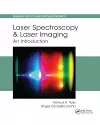
Laser Spectroscopy and Laser Imaging
2 authors - Paperback
£71.99
Helmut H. Telle received his degrees in Physics from the University of Cologne, Germany, in 1972 (BSc), 1974 (MSc) and 1979 (PhD), respectively. He exploited his newly-gained experience in and passion for laser spectroscopy during an extensive postdoctoral research period, which found him expanding his horizons at universities and research institutions in Canada and France, at physics and chemistry departments. In 1984 he settled in Wales, United Kingdom, to embrace a career in teaching and research in laser physics at Swansea University. His research activities – both at Swansea and within the framework of numerous international collaborations – encompass a wide range of laser-spectroscopic techniques. These he used predominantly for trace detection of atomic and molecular species, and applied them to analytical problems in industry, biomedicine and the environment on the one hand, but also to various fundamental aspects in science on the other hand. After nearly 30 years in Wales, he relocated to Spain to join the Instituto Pluridisciplinar of Madrid’s Universidad Complutense. Here he pursues new frontiers in laser spectroscopy of exotic species of interest to astroparticle physics and astronomy.
Ángel González Ureña graduated in chemistry from the University of Granada (Spain) in 1968, and then obtained his PhD in Physical Chemistry at the Universidad Complutense de Madrid in 1972. During the period 1972-1974 he carried out postdoctoral research at the Universities of Madison (Wisconsin, USA) and Austin (Texas, USA), embracing reaction dynamics in molecular beams. On his return to Spain he took up the position of Associate Professor in Chemical Physics at the Universidad Complutense de Madrid, and was promoted to Full Professor in 1983. The focus of his research activities mainly was on gas-phase, cluster and surface reaction dynamics, mostly utilizing molecular beam and laser spectroscopic techniques. In said work he was one of the pioneers in measuring threshold energies in chemical reactivity when changing the translational and electronic energy of the reactants. In recent years his interests branched out into the application of laser technologies to Analytical Chemistry, Environmental Chemistry, Biology and Food Science. He is heading the Department of Molecular Beams and Lasers at the Instituto Pluridisciplinar, associated with Madrid’s Universidad Complutense; for the first ten years of the institute’s existence he also was its first director.